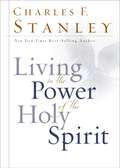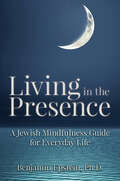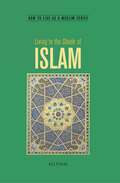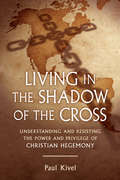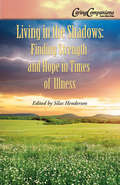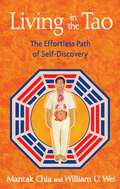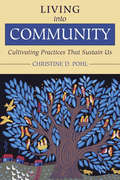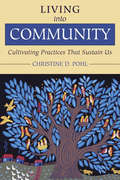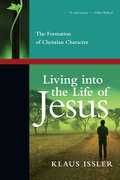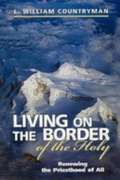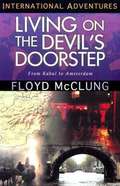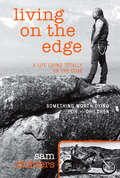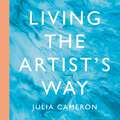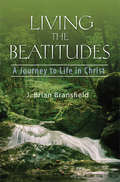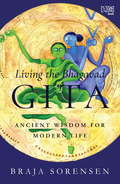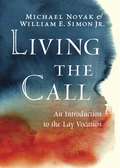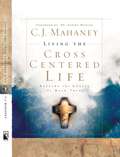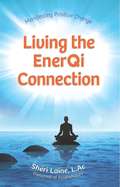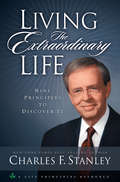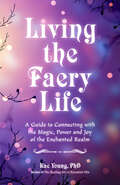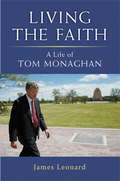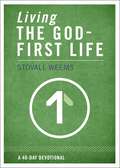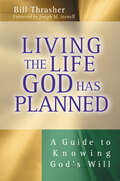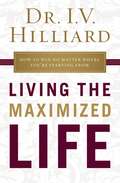- Table View
- List View
Living in the Power of the Holy Spirit
by Charles F. StanleyIs the third Person of the Trinity a distant mystery, a vague cosmic force?Many believers acknowledge Him as a component of faith?but perhaps not as a reality in their daily spiritual walk. Yet the Bible is clear: the Holy Spirit is a vital, equal part of God, promised by the Father to all Christians.In Living in the Power of the Holy Spirit, beloved pastor and Bible teacher Charles Stanley reveals the inner working of the Spirit with simple, straightforward wisdom. With this book, you can better experience this awesome gift of God as you discover:What holiness is?and is notSeven works of the Holy Spirit in your lifeThree potentials God desires you to developHow to remain full of the Holy SpiritFour great questions to ask God every dayIf you are faltering, or easily fall prey to temptation, maybe you've forgotten to rely upon the power of the Holy Spirit and begun to rely only on yourself. The Christian life is meant to be increasingly dependent on His power working within you. Learn today to live in the power of the Holy Spirit.
Living in the Presence: A Jewish Mindfulness Guide for Everyday Life
by Benjamin EpsteinIn our frantic, fast paced society, we need constant guidance to remind us that we can only find the peace of mind we sorely lack by looking inward. Judaism, like many other spiritual traditions, offers a unique path to cultivating fulfillment and presence of mind. In cultivating peace of mind, we do not aim to achieve transcendence. Rather, our goal is to enter fully into whatever is occurring in our lives and meet it with full presence. But being a better Jew and a happier person are not mutually exclusive. On the contrary, they are mutually interdependent. From the moment we wake to the moment we fall asleep, biblical commandments provide us with guidelines that encourage us to be aware of the present moment. A Guide to Jewish Mindfulness provides concise and clear instructions on how to cultivate peace of mind in order to attain a life of greater commitment and inspiration for the present moment.
Living in the Shade of Islam: How to Live As A Muslim (How to Live as a Muslim)
by Ali UnalThe How to Live as a Muslim series is an essential guide for anyone who seeks to acquire an accurate knowledge of Islam, as it elucidates all the facets of Islam with precise brevity in three volumes: An Introduction to Islamic Faith and Thought, Living in the Shade of Islam, and Living the Ethics and Morality of Islam. This book covers in detail the other four pillars of Islam: the establishment of the five daily prayers, the prescribed purifying alms, observing the fast of Ramadan, and the pilgrimage to Makka. The volume also examines cleanliness, the issues of marriage and family life, the lawful, and the unlawful
Living in the Shadow of the Cross: Understanding and Resisting the Power and Privilege of Christian Hegemony
by Paul KivelHow our dominant Christian worldview shapes everything from personal behavior to public policy (and what to do about it)Over the centuries, Christianity has accomplished much which is deserving of praise. Its institutions have fed the hungry, sheltered the homeless, and advocated for the poor. Christian faith has sustained people through crisis and inspired many to work for social justice.Yet although the word "Christian" connotes the epitome of goodness, the actual story is much more complex. Over the last two millennia, ruling elites have used Christian institutions and values to control those less privileged throughout the world. The doctrine of Christianity has been interpreted to justify the killing of millions, and its leaders have used their faith to sanction participation in colonialism, slavery, and genocide. In the Western world, Christian influence has inspired legislators to continue to limit women's reproductive rights and has kept lesbians and gays on the margins of society.As our triple crises of war, financial meltdown, and environmental destruction intensify, it is imperative that we dig beneath the surface of Christianity's benign reputation to examine its contribution to our social problems. Living in the Shadow of the Cross reveals the ongoing, everyday impact of Christian power and privilege on our beliefs, behaviors, and public policy, and emphasizes the potential for people to come together to resist domination and build and sustain communities of justice and peace.Paul Kivel is the award-winning author of Uprooting Racism and the director of the Christian Hegemony Project. He is a social justice activist and educator who has focused on the issues of violence prevention, oppression, and social justice for over forty-five years.
Living in the Shadows
by Silas HendersonFor one living with an illness, the world can seem an unrelenting stream of doctor's visits, medical procedures, pain, fatigue, and isolation. And while this book can't answer the question of "why" some must face these challenges, it does address the important question of "How can I face this illness with strength and hope?"
Living in the Tao: The Effortless Path of Self-Discovery
by Mantak Chia William U. WeiTaoist techniques that can quiet your mind so you can discover your true self in the wisdom of the heart • Teaches that the Tao is the flow of nature, the effortless middle path of self-discovery • Shows how to quiet the monkey mind (the ego) and listen within for your inner voice • Fosters a connection to the Tao through diet, exercise, livelihood, and sexuality Taoists say that we must learn to observe with the mind and think with the heart. In the West we get caught up in the “monkey mind” of our ego. We think we can control our individual destinies by swimming upstream against the current, but we are mistaken. When we learn to quiet the monkey mind with meditation practices, we are able to go beyond the linear thinking of the upper brain and connect to the multidimensional thinking of supreme consciousness in the heart center. In Living in the Tao, Master Mantak Chia and William Wei present techniques to help us learn to move beyond the limits of time and space to connect with the universal truth within--without striving. Living in the Tao is effortless. Just as a small seed grows into a mighty tree with a little water and a little sunshine every day, a few minutes of Taoist practice each day can transform your life into one of peace and joy.
Living into Community: Cultivating Practices That Sustain Us
by Christine D. PohlEvery church, every organization, has experienced them: betrayal, deception, grumbling, envy, exclusion. They make life together difficult and prevent congregations from developing the skills, virtues, and practices they need to nurture sturdy, life-giving communities.In Living into Community Christine Pohl explores four specific Christian practices -- gratitude, promise-keeping, truth-telling, and hospitality -- that can counteract those destructive forces and help churches and individuals build and sustain vibrant communities. Drawing on a wealth of personal and professional experience and interacting with the biblical, historical, and moral traditions, Pohl thoughtfully discusses each practice, including its possible complications and deformations, and points to how these essential practices can be better cultivated within communities and families.
Living into Community: Cultivating Practices That Sustain Us
by Christine D. PohlEvery church, every organization, has experienced them: betrayal, deception, grumbling, envy, exclusion. They make life together difficult and prevent congregations from developing the skills, virtues, and practices they need to nurture sturdy, life-giving communities.In Living into Community Christine Pohl explores four specific Christian practices -- gratitude, promise-keeping, truth-telling, and hospitality -- that can counteract those destructive forces and help churches and individuals build and sustain vibrant communities. Drawing on a wealth of personal and professional experience and interacting with the biblical, historical, and moral traditions, Pohl thoughtfully discusses each practice, including its possible complications and deformations, and points to how these essential practices can be better cultivated within communities and families.
Living into the Life of Jesus: The Formation of Christian Character
by Klaus IsslerWhy does merely understanding and trying hard to follow the example of Jesus often yield little progress—and even less joy and peace? Deriving insights from the life of Jesus in the Gospels, Klaus Issler uncovers the dynamics involved in truly becoming more Christlike. He shows how you can forge much deeper connections with Jesus so that his life permeates your own character. The result is a closer alignment between what you want to do as a follower of Jesus, what you actually do and who you are becoming in your relationship with him. Learn to be transformed from the inside out.
Living on the Border of the Holy: Renewing the Priesthood of All
by L. William Countryman"The first thing to say in our exploration of priesthood is this: priesthood is a fundamental and inescapable part of being human. All human beings, knowingly or not, minister as priests to one another. All of us, knowingly or not, receive priestly ministrations from one another. Unless we begin here, we are not likely to understand the confusions and uncertainties and opportunities we have been encountering in the life of the church itself in recent years. We shall be in danger, in fact, of creating makeshift solutions to half-understood problems, easy answers to misleading questions, temporary bandages for institutions that need to be healed from the ground up. " - L. William Countryman There is a lot of tension in churches today about whose ministry is primary-that of the laity or of the clergy. L. William Countryman argues that we can only resolve that problem by seeing that we are all priests simply by virtue of being human and living, as we all do, on the mysterious and uncertain border with the Holy. Living on the Border of the Holy offers a way of understanding the priesthood of the whole people of God and the priesthood of the ordained in complementary ways by showing how both are rooted in the fundamental priestly nature of human life. After an exploration of the ministry of both laity and ordained, Countryman concludes by examining the implications of this view of priesthood for churches and for educating those studying for ordination.
Living on the Devil's Doorstep: From Kabul to Amsterdam
by Floyd McclungWhen thousands of young people checked out of Western society and sought enlightenment in the East, Floyd and Sally McClung set aside the comforts of American suburbia and answered God's call to reach out to them with the gospel. In Kabul, Afghanistan, a key stop on the hippy trail, and later in Amsterdam, Holland, the West's own window to that trail, the McClungs committed themselves to meeting the penniless, the drugged, the sick, and the disillusioned right where they were. Whether among hippy seekers or the addicts and prostitutes of Amsterdam's infamous Red Light District, the McClungs lived out a message of hope. Living on the Devil's Doorstep is a dramatic example of the difference one family can make when they are willing to trust GOd and walk in obedience to His call for their lives. On every continent, in every nation, God is at work in and through the lives of believers. From the streets of Manila to mysterious Albania to the jungles of Ecuador and beyond. This and every title in the International Adventures series emerges as a dramatic episode that could be directed only by the hand of God. There are 14 books in this International Adventures series.
Living on the Edge
by Sam Childers"Living on the EDGE" is the saga of a man who redirected his energy and bravery from drug dealing and debauchery to serving God. A compelling, first person account by Sam Childers, AKA "The Machine Gun Preacher." Detailing His battle to HELP the orphan children of Eastern Africa. The book is a follow up to Sam's BEST SELLER - Another Mans War, which was made into a Hollywood movie, Machine Gun Preacher, starring Gerard Butler as Sam!
Living the Artist's Way: An Intuitive Path to Creativity
by Julia Cameron'Without The Artist's Way, there would be no Eat, Pray, Love' - ELIZABETH GILBERTWATKINS TOP 100 MOST SPIRITUALLY INFLUENTIAL PEOPLE OF 2023How can we tap into the wisdom inside ourselves?LIVING THE ARTIST'S WAY is a Six-Week Artist's Way Program that explores the fourth essential Artist's Way tool of guidance. Bestselling author Julia Cameron has inspired millions through creative recovery with her essential tools including Morning Pages, Artist Dates, Walks, and now, Writing for Guidance. Through the practice ofmorning rituals and the faith of listening, Julia takes us further and shows how we can set the stage to receive guidance in both our lives and creative art.Writing about how she uses these tools to handle doubts in her life, Living the Artist's Way reveals a personal side and shares Julia's pathway toward a happier, lighter life. Grounding and reassuring, guidance can quell our doubts and fears, and lead us to our inner wisdom and authentic selves. Living the Artist's Way is an invitation to seek the answers to navigate all areas of our lives, by tapping into our own wisdom and ultimately, guiding ourselves back to creativity.
Living the Beatitudes
by J. Brian BransfieldIn Living the Beatitudes, you are invited to drink from the fountain of holiness and re-discover the mystery of Grace and the peace of living life in the Spirit. The beatitudes are a path that is right in front of us if only we would move from our fears and allow the spirit to guide us. Best-selling author J. Brian Bransfield helps you re-invigorate your spirituality by offering a life-giving practice and understanding of the Catholic faith.
Living the Bhagavad Gita: Ancient Wisdom for Modern Life
by Braja Sorensen`Armed with yoga, stand and fight? In this startlingly original book, Braja Sorensen combines the teachings of Sri Krishna and the sage Patanjali to emphasize the real purpose of yoga: it is a way of life, and its goal is the union with the Divine. It is yoga, through progressive stages of inner growth, that Krishna is actually teaching Arjuna on the battlefield as he addresses the prince?s fears, doubts and dilemmas. And the questions that Arjuna asks Krishna are as relevant and pressing for the modern reader as they were centuries ago: Why am I suffering? How do I find peace within? How do I comprehend the difference between right and wrong? Who am I, and how do I understand myself? What is the purpose of life? Braja Sorensen presents a lucid analysis of the multiple meanings of the word `yoga? that Krishna teaches in the Bhagavad Gita, for its every verse is about yoga. The yogic journey is a process of training and refining the mind, senses and emotions, until the very consciousness is altered and ready to meet the Divine. Patanjali, meanwhile, explains the link between the body, mind and soul, and how the practice of yoga affects each. Living the Bhagavad Gita brings to you the life-changing qualities that Krishna taught, and shows you how the Bhagavad Gita is the finest guide to understanding life, love and relationships, the body, mind and senses, and the nature of the soul.
Living the Call
by Michael Novak William E SimonSince 1965 the number of priests in the United States has fallen by some 30,000. But over that same time period, more than 30,000 laypeople have come into the employ of parishes and other Church institutions. Laypeople have stepped up to serve in a variety of new ministries, and they are relieving their pastors of many administrative burdens, enabling them to focus on their proper priestly duties. Lay teachers now outnumber nuns, brothers, and priests in Catholic schools by at least 19 to 1. In the history of the Church, laypeople have never been asked to do so much.William E. Simon, Jr. and Michael Novak call attention to this great shift in Living the Call. The first part of the book tells the personal stories of nine faithful laypeople now serving the Church in new and diverse ways. Simon and Novak's insight is that more and more who work in the Church feel the need to shape their lives in a new way, matched to their different needs and adjusted to the new base of knowledge about the world with which they begin. In response to this need, the second part of Living the Call offers practical examples and reflections on a number of themes, including entering into the presence of God and learning different forms of prayer, reading that refreshes the mind and deepens the soul, and the graces of the sacraments and how being a spouse contributes to holiness.
Living the Cross Centered Life: Keeping the Gospel the Main Thing
by C. J. MahaneyWhat Really Matters Have the extremities taken over and left the core of your faith forgotten? Do you get confused by what you feel versus what is real? Let dynamic pastor C. J. Mahaney strip away the nonessentials and bring you back to the simplest, most fundamental reason for your faith: Jesus Christ. This book is packed with powerful truth that will grip your heart, clear your mind, and invigorate your soul. Chapters include “Breaking the Rules of Legalism,” “The Cross Centered Day,” and “Assurance and Joy. ” Get ready to behold a breathtaking view of what God intends to accomplish in and through you every day. You’ll discover how embracing this cross centered life is both our highest privilege and greatest responsibility. Banner: Combines the C. J. Mahaney favoritesThe Cross Centered LifeandChrist Our Mediatorwith new material. His Gift, Your Hope Do you desire more passion for Jesus Christ? Return to the very essence of your faith-the cross of Christ. Here, the deepest truths of Calvary will stir your passion for Him into an unquenchable fire. “Never lay it aside. Never move on,” says C. J. Mahaney, who shows you how to center every day around the life-giving reality of the gospel and how to escape the pitfalls of legalism, condemnation, and feelings-driven faith. One center, countless radical changes. “Every Timothy needs a Paul. C. J. Mahaney is minehellip;and this book contains his life-message. Read it yourself, and let God realign your life. ” Joshua Harris Pastor and bestselling author “With tenderness and power, C. J. illustrates the critical difference betweensnacking on the benefits of the crossandsurveying the wonders of the cross. This is a must and magisterial read!” Scotty Smith, senior pastor, Christ Community Church Franklin, Tennessee Story Behind the Book C. J. Mahaney’sThe Cross Centered LifeandChrist Our Mediatorare life-changing books whose unique messages are even more powerful when combined. Living the Cross Centered Lifeis a careful melding of these two books with new content as well. For readers who have not yet discovered the stand-alone books, or for Mahaney fans ready to cherish their favorites in a new package, this book is sure to become a treasured classic. From the Hardcover edition.
Living the EnerQi Connection: Demystifying Acupuncture
by Sheri LaineYou can have greater strength and vitality through ancient Chinese balancing principles Laine calls 'EnerQi'. Everyone wants to feel healthy, strong, and alive. Sheri Laine, a 28-year practitioner of Oriental medicine, shows readers how to do just that through a unique concept using the L.A.I.N.E. method: Learn, Align, Inform, Natural, Energy. In Living the EnerQi Connection, acupuncturist Laine explains how Qi—the vital energy that circulates round the body in currents—works and how readers can benefit by cultivating and nurturing it. The way in which we choose to harmonize and preserve this energy is what Laine calls EnerQi. Because this force field changes based on how well we take care of ourselves and by the lifestyle choices we make, we can actually raise our energy frequency to a much higher level, becoming stronger, happier and more alive than ever before. Living the EnerQi Connection is not only an enjoyable read, but its demystification of concepts and traditions from ancient Oriental medicine, including the art of acupuncture, is easy to understand. Readers will discover an uncomplicated path to achieving balance by incorporating beneficial changes in their daily lives that will empower them to be healthier, happier, more relaxed, and more fulfilled.
Living the Extraordinary Life: Nine Principles to Discover It
by Charles StanleyTo many in the world, the Christian faith is a set of rules and regulations. But Jesus himself did not teach his followers in sets of dos and don'ts; he taught them foundational principles to live by. These life principles, Charles Stanley says, are the simple truths that act as a compass for our souls. You will learn: Your life is a Masterpiece Waiting on God is not passive Disappointments are inevitable, but discouragement is a choice You were created with eternity in your heart God assumes full responsibility for your needs when you obey Him Using examples from his own personal experiences, Biblical personalities, and case studies, Dr. Stanley demonstrates how these key life principles impact life in the 21st century-and how they make us, as Christians, different from those who live their lives according to preference, rather than principles.
Living the Faery Life: A Guide to Connecting with the Magic, Power and Joy of the Enchanted Realm
by Kac YoungEnter the Enchanted Faery Realm"I recommend Living the Faery Life to all who wish to awaken the magic in their lives.” —Shelley A. Kaehr, PhD, author of Egyptian Energy Healing, Pythagorean Healing & Edgar Cayce’s Sacred StonesAuthor Kac Young is a three-doctorate, prolific author who has studied world religions extensively and has worked in television for over thirty years. In writing Living the Faery Life she draws upon the ancient wisdom of her Celtic roots.You are cordially invited to begin your magical relationship with the faery world. Many of the things we believe about faeries are old wives’ tales, made-up myths, and invented stories to satisfy cultural curiosity. Here, you will learn how to separate myth from truth and discover how to create your private faery kingdom.Learn the rules of faery life and reconnect with nature. Discover how to make a faery garden, what particular trees and plants attract faery folk, and rituals you can perform to connect with the faery realms. Even if you are not yet a fully-fledged “Faery Believer,” a walk in the outdoors will never be the same once you have been touched by the wisdom and enchantment of Living the Faery Life.Living the Faery Life is a guide for everyone: Tinkerbell fans, faery non-believers, fanatics, Pagan and Wiccan practitioners, as well as devotees who enjoy the ritual use of candles and crystals.Learn about the Faery world and the rules Faeries live byNurture an innate connection with the wild and natural worldAwaken the deep magic, wonder and joy of the Faery RealmIf you have read books such as Moon Spell Magic by Cerridwen Greenleaf, Moonology by Yasmin Boland, or The Green Witch by Arin Murphy-Hiscock, you'll want to pick up a copy of Living the Faery Life.
Living the Faith: A Life of Tom Monaghan
by James LeonardWho is Tom Monaghan? Is he the four-year-old kid whose father died on Christmas Eve and whose mother sent him to an orphanage and then a juvenile detention home? Is he the entrepreneurial genius who built Domino's Pizza from a hole-in-the-wall pizzeria in Michigan into an American brand as world-conquering as Ford or Coke? Is he the religious visionary who sold Domino's for $1 billion to create an orthodox Catholic university, law school, and special interest law firm with the goal of transforming America to reflect his conservative values? He's all that and more. With extensive interviews with friends and enemies plus unprecedented access to the man himself, but wholly without his authorization, Living the Faith illuminates Tom Monaghan, the man and the myth. Living the Faith is the much-needed, definitive biography of one of the most fascinating and controversial figures in the realms of American business and religion. Through eighteen hard-boiled chapters, journalist James Leonard follows Monaghan on his path from a heartbroken kid who climbed into his father's coffin to the business tycoon who purchased the world-champion Detroit Tigers and spent a fortune on his own air force, navy, and island to the religious visionary who founded a university to make saints and a public interest law firm to overturn evolution. A sympathetic but critical perspective of the man and his works, this book is for believers, nonbelievers, and agnostics; for conservatives, liberals, and independents; for the rich, the poor, and the shrinking middle class. Mainly, however, this book is for those who want the facts about Tom Monaghan---and the truth about the effect religion had on one man and the effect that man had on the world.
Living the God-First Life
by Stovall WeemsThe devotional companion to Stovall Weems’ book The God First Life, will help you un-complicate your life through understanding and implementing the principle of God-first living. Everywhere you look there are how-to books for improving various areas of our lives such as finances, fitness, business, marriage, friendships, etc. The list can be exhausting! If we were to add up all the tips and methods, there would be hundreds of things to keep in mind just to make it through a single day. Often, in our search for ways to improve our lives, we mistake depth and discipleship for a long list of prescribed “spiritual-to-dos”, and lose the simplicity of following Jesus in the moment. But what if it is possible to boil it all down to one simple, un-complicated principle that would bring the solutions and wisdom we are looking for? It’s called living the God-First Life – your life, God’s way. Every area of life brings different seasons of change, and one thing is for certain - we will always face challenges. True peace comes from living a life of faith that is grounded first and foremost in trust. Do we trust when God says He’s got our backs? Can we let go of things we don’t have the answers to and trust Him enough to simply follow? Can we follow him in the moment, no matter what baggage we carry and what spiritual milestones we’ve yet to conquer? here’s a much more vibrant way to live and act in faith, and it is much simpler than you would think.
Living the Life God Has Planned: A Guide to Knowing God's Will
by Bill ThrasherA basic guide to discerning the will of God. "How do I know what God's will is for my life?" It is perhaps the most common question asked by Christians today. Dr. Bill Thrasher has provided a basic guide to the fundamentals of seeking God's will in Living the Life God Has Planned. Thrasher teaches readers that they must first seek to know God on a more intimate level before His will becomes more apparent to them. Readers of all maturity levels will appreciate the simplicity and practical nature of this product.
Living the Life God Has Planned: A Guide to Knowing God's Will
by Bill ThrasherA basic guide to discerning the will of God. "How do I know what God's will is for my life?" It is perhaps the most common question asked by Christians today. Dr. Bill Thrasher has provided a basic guide to the fundamentals of seeking God's will in Living the Life God Has Planned. Thrasher teaches readers that they must first seek to know God on a more intimate level before His will becomes more apparent to them. Readers of all maturity levels will appreciate the simplicity and practical nature of this product.
Living the Maximized Life: How To Win No Matter Where You're Starting From (The\maximized Life Journey Ser.)
by I. V. HilliardLearn how to make the most of your life starting today! In order to maximize all aspects of your life and to achieve the life God wants for you, believers must actively participate. In "Living the Maximized Life," Dr. I.V. Hilliard acts as your personal coach, guiding you step by step through the process of making the most of life, regardless of where you start. He will show you how to maximize your mistakes, the power of your words, the potential of you mind, and the use of your money.Dr. Hilliard offers an easy-to-follow blueprint that features new methods, meditations, mentality, and mechanics for maximizing your life. By delving into Scripture and sharing his own life experiences - as well as those of others who have reached their breaking point and broken through instead of breaking down - Dr. Hilliard raises your awareness of the barriers in your life and how to overcome them."Living the Maximized Life" shows you how to realize a life of inner peace, financial success, and personal happiness that God eagerly desires to give.
